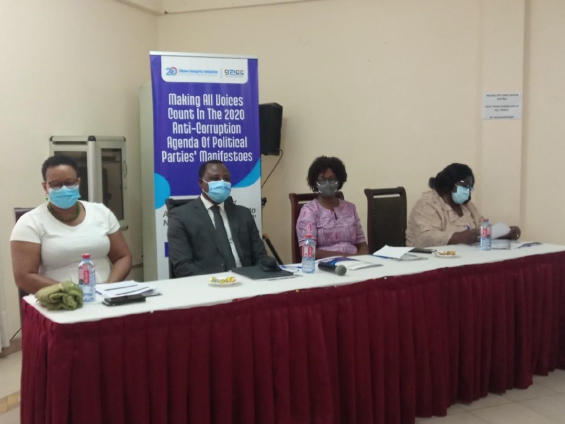The Ghana Anti-Corruption Coalition (GACC) has launched the Citizens' Anti-Corruption Manifesto (CACM) to serve as a basis for conversations on potential anti-corruption reforms.
Executive Secretary of the GACC Beauty Emefa Narteh, expressed the hope that political parties would embrace the issues identified by citizens and be guided by the broad recommendations to fashion out their own specific approach to addressing corruption in Ghana.
The CACM was developed by the Coalition and the Ghana Integrity Initiative (GII), with funding from the STAR-Ghana Foundation.
It is aimed at making corruption a key election issue this year thereby improving Ghana’s anti-corruption performance in subsequent years.
Mrs Narteh said the Coalition and other CSOs were implementing a STAR-Ghana Foundation funded project, dubbed; “Making All Voices Count in the 2020 Anti-Corruption Agenda of Political Parties’ Manifestoes” to increase citizens’ voices in the anti-corruption agenda.
She said the CACM Report underscored government’s inclination to execute its Manifesto rather than the country's development plan.
Joseph Whittal, the Chairman of the Commission on Human Rights and Administrative Justice, who launched the Report, said CSOs were creating a powerful platform that would set out the conversation for the next several months leading to the election.
Mrs Mary Awelana Addah, the Programmes Manager, GII, said going forward the organisation was planning to sustain the discourse by mobilising the mass of CSOs and the media to begin to interrogate the sources of funding of political parties.
Dr Esther Ofei-Aboagye, the Chairperson of STAR-Ghana Foundation, said the Foundation was happy to be associated with the CACM document having an immeasurable value.
The CACM seeks to create stakeholder awareness on citizens’ view on anti-corruption reforms for inclusion in political parties’ manifestos and to increase support and commitment in fighting the canker.
It also seeks to create the pathway for political parties to design and implement appropriate legal and policy/administrative reforms to tackle corruption on a more sustainable basis.
In compiling the CACM, the GII and GACC collated the views of a wide spectrum of sub-groups in Ghana including faith-based organisations, traditional rulers, and anti-corruption experts.
Others were women groups, students, civil society organisations, people with disability and other marginalized groups.
Latest Stories
-
Donewell Life Assurance rebrands to Pinnacle Life Insurance: A new era of excellence
3 mins -
NDC blames ECG’s poor revenue collection for energy sector challenges
5 mins -
MEST Africa, Mastercard Foundation celebrate EdTech Innovations at Demo Day in Accra
10 mins -
AWA reaffirms commitment with FOD Walk during Safety Week
14 mins -
Kuami Eugene hopeful he’ll be first Lynx artiste to survive after leaving the label
25 mins -
Akufo-Addo seeks to use Bawumia to complete Akyem agenda – Asiedu Nketia alleges
27 mins -
National Cathedral: CHRAJ recommends investigation, contract cancellation, possible prosecution
31 mins -
Dr James Orleans-Lindsay wins Man of the Year at 9th EMY Africa Awards
33 mins -
Medical Council to enforce specialist distribution nationwide
1 hour -
Fire guts old Fadama market, man reportedly loses GHC800,000
1 hour -
Nacee bemoans low performance fees for gospel artistes
1 hour -
We don’t operate investment platform – GNPC
1 hour -
Ghana Fact-checking Coalition condemns disinformation on voting by Wontumi FM broadcaster
1 hour -
IFRS 17 will augment and accelerate NIC’s efforts to implement risk-based capital – Deloitte
1 hour -
IFRS 17 is one of biggest changes to financial reporting standards in insurance industry – Deloitte
2 hours

